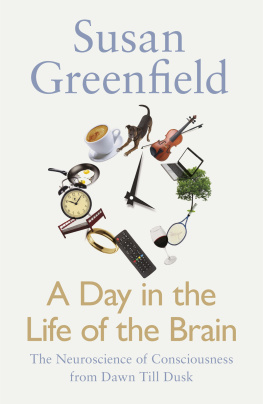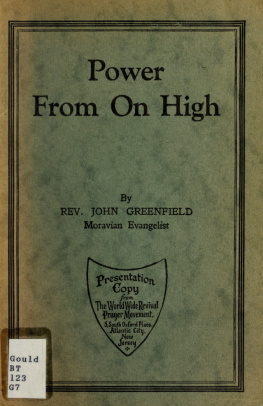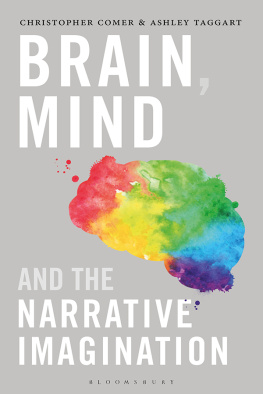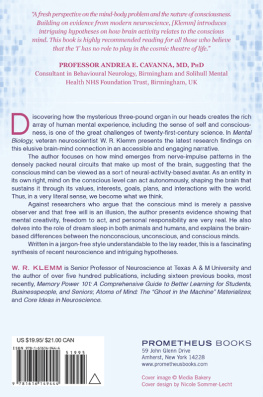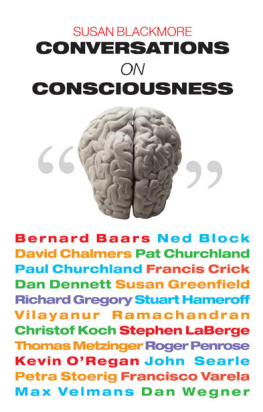PENGUIN BOOKS
THE PRIVATE LIFE OF THE BRAIN
Susan A. Greenfield is a leading neuroscientist based at the Department of Pharmacology, Oxford. She is the Director of the Royal Institution of Great Britain and is the author of Mindwaves, Journey to the Centres of the Mind and The Human Brain: A Guided Tour. She presented a six-part television series on the brain, called Brainstory, for BBC2, and is author of the accompanying book of the same name. She is an Honorary Fellow of the Royal College of Physicians. In 2000 she was awarded a CBE and a Life Peerage in 2001.
THE PRIVATE LIFE OF THE BRAIN
Susan Greenfield

PENGUIN BOOKS
PENGUIN BOOKS
Published by the Penguin Group
Penguin Books Ltd, 80 Strand, London WC2R 0RL, England
Penguin Putnam Inc., 375 Hudson Street, New York, New York 10014, USA
Penguin Books Australia Ltd, 250 Camberwell Road, Camberwell, Victoria 3124, Australia
Penguin Books Canada Ltd, 10 Alcorn Avenue, Toronto, Ontario, Canada M4V 3B2
Penguin Books India (P) Ltd, 11 Community Centre, Panchsheel Park, New Delhi 110 017, India
Penguin Books (NZ) Ltd, Cnr Rosedale and Airborne Roads, Albany, Auckland, New Zealand
Penguin Books (South Africa) (Pty) Ltd, 24 Sturdee Avenue, Rosebank 2196, South Africa
Penguin Books Ltd, Registered Offices: 80 Strand, London WC2R 0RL, England
www.penguin.com
First published simultaneously in the USA and Canada
by John Wiley & Sons, Inc. 2000
First published in Great Britain by Allen Lane The Penguin Press 2000
Published in Penguin Books 2001
Reissued 2002
12
Copyright Susan Greenfield, 2000
All rights reserved
The moral right of the author has been asserted
Except in the United States of America, this book is sold subject to the condition that it shall not, by way of trade or otherwise, be lent,re-sold, hired out, or otherwise circulated without the publishers prior consent in any form of binding or cover other than that in which it is published and without a similar condition including this condition being imposed on the subsequent purchaser
ISBN: 978-0-14-193787
For
David Brynmor Thomas
C ONTENTS
P REFACE
This book initially started life as a neuroscientists exploration of pleasure. I was fascinated by what motivated so many of my colleagues and friends to work hard, to accrue money, and to invest long hours in a library or office, when instead they could simply have been sitting in the sun or enjoying a good claret. Obviously, they needed to survive and feed and clothe their children, but many of us in Western society can achieve those goals without working the long hours that many do. And the price paid seemed crazy. You have only to look at children splashing in a paddling pool, and in general living for the moment, to feel that one has, perhaps, lost the plot. What has actually happened in the brain?
The human condition seems to entail an uneasy vying between times of abandonment when we let ourselves go and other timesmost of the time, in factwhen we are developing or broadening our minds, where above all, we have a strong sense of ourselves and some partial control, at least, over what is happening around us. The more I tried to translate into brain terms this dichotomy between the sensual, momentary existence and the self-conscious adult human mind-set, the more I realized that it did not apply to pleasure alone, but to a far wider range of basic emotions. Hence the quest for a neurophysiology of pleasure widened into a consideration of all the emotions, both how the brain can accommodate their diversity, as well as whether there might be a common basic factor that distinguishes an emotion, in general, as such. My solution as you will see, is that emotions and the mind are not stark polar opposites, but rather the ends of a continuum.
In order to match up what we feel to greater or lesser extents at any time with what is going on in the brain, I was thankful for my earlier training in neuropharmacology; it seemed to me that drugs offered the perfect Rosetta Stone, a bridge, for relating two sets of phenomena, one objective (physical events in the brain), the other subjective (what you are feeling), that normally are hard to link up with each other. Nonetheless, by looking at various conditions resulting from the use of both prescribed and proscribed drugs, it seems possible to work out a more general scheme for the human condition and how it unfolds from one moment to the next in the brain. Yet such a journey inevitably leads us to the most challenging question of all: How does the brain generate the firsthand experience of feeling, of consciousness?
I do not presume to have come up with The Answer here, but in the final chapter, I do offer some thoughts that I hope will make a contribution to the debate. Having suggested a theory in my earlier book Journey to the Centers of the Mind, I have now been able to develop the basic idea that consciousness varies in degrees that are correlated with highly evanescent assemblies of neurons. The final chapter outlines the different factors that govern formation of these assemblies, and describes how in turn their configuration and size in the physical brain indicate different states of mind. Finally, we turn to the important issue, often overlooked by neuroscientists, that brain functioning must always be seen as an integral part of the whole body: I suggest a means whereby the brain and body function in concert and argue that it is the iteration between body and brain that is consciousness. For those with a taste for the technical, the Appendix offers a more detailed, physiological account of the scheme.
The basic message of this book is that emotions such as pleasure necessitate a temporary abrogation of the self, the individual carefully developed throughout a lifetime. Perhaps this is an idea that has long lurked in our folklore, captured in expressions such as blowing the mind, but which is now rooted here in the physical brain. As such, I hope this book may provide some more insight into why and how we do what we do for pleasure or otherwise.
Many people have helped bring the manuscript to fruition. First are my editors, Emily Loose at Wiley and Stefan McGrath at Penguin, who have seen the text through various incarnations and who have given invaluable advice. In addition, my agents, John Brockman and Katinka Matson, should be thanked for their unstinting support and help. I am also very grateful to the following colleagues for helping with endless queries: Henry Marsh, Nick Rawlins, Ole Paulsen, Kim Jobst. But above all, I wish to acknowledge my husband, Peter, for providing continued support, advice, and encouragement, and without whom I would never have been able to have even started this project.
This book is dedicated to David Brynmor Thomas. I first met David in 1996, when he was supposed to have retired but was acting head of the technology transfer unit of Oxford University. My colleague David Vaux and I were filing a patent and were interested in starting a biotech company as a consequence. Without David Thomass flair, humor, imagination, and courage, we would never have gotten past first base. Just as the company, Synapticawhere he ended up as Secretarywas starting to flourish, David tragically developed a fast-growing cancer and died within a few months, in May 1999. Both David Vaux and I feel his loss keenly, not only as a valued mentor professionally, but also as someone who came to be a very close friend. This book is not about companies nor technology transfer, but I hope David would have liked it.
Susan Greenfield
Oxford
Next page


